
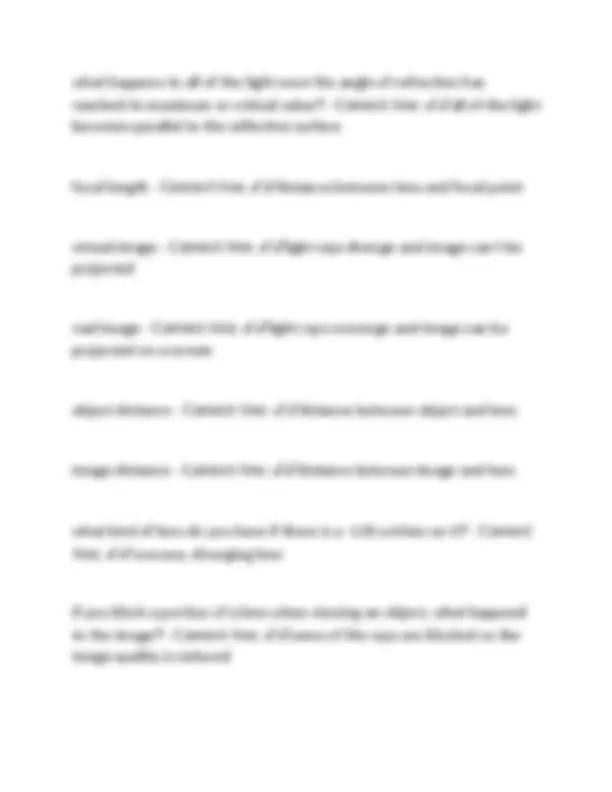
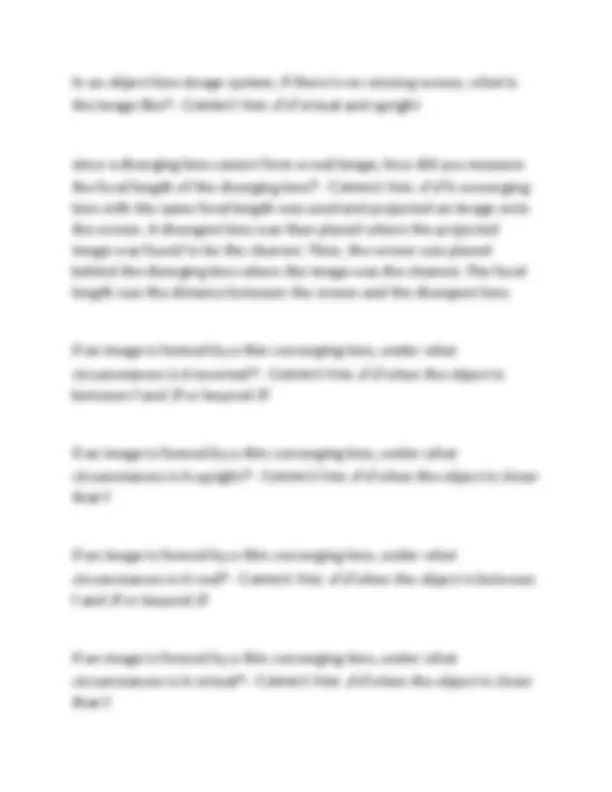
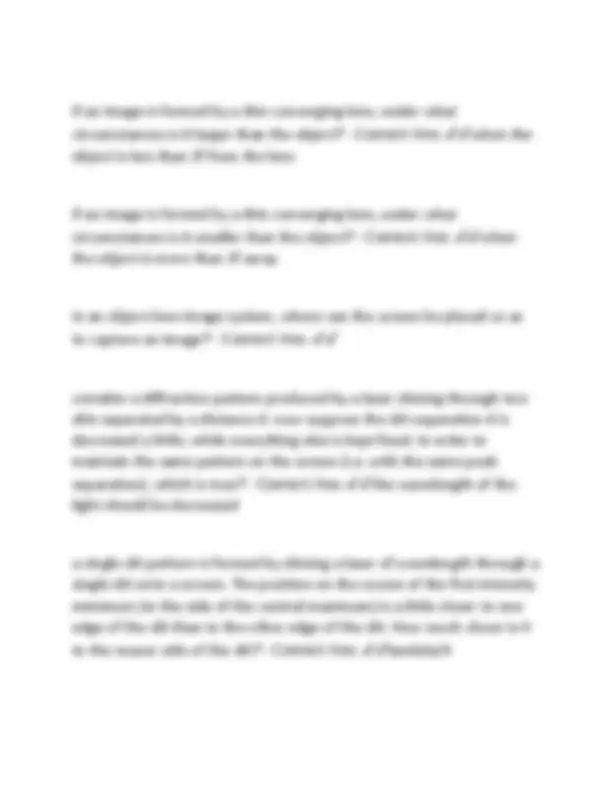
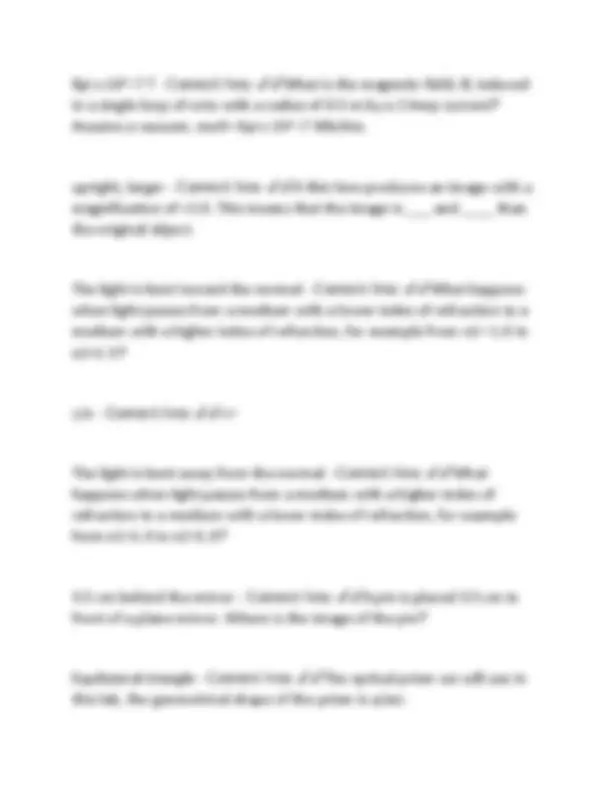
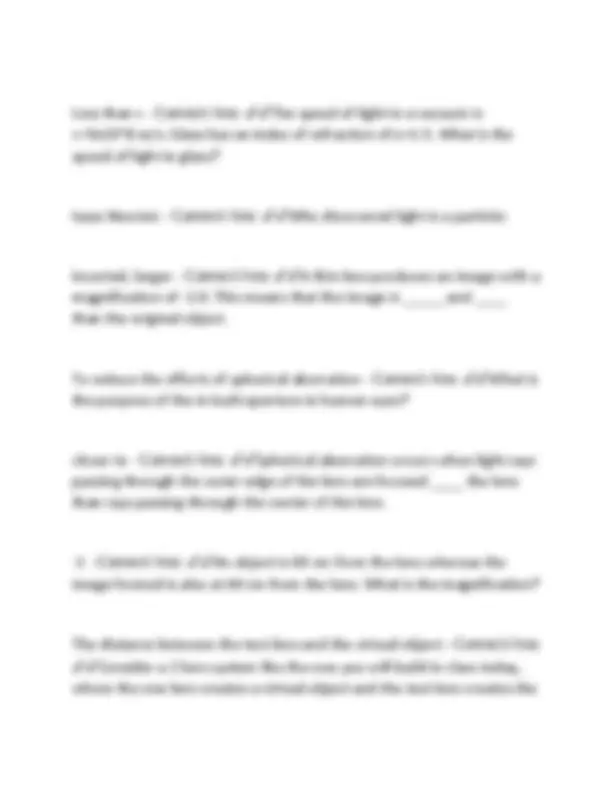
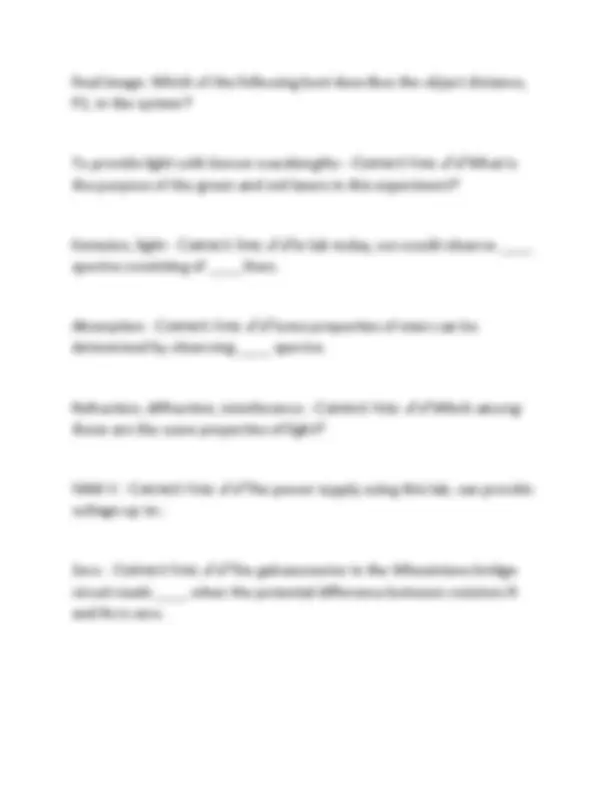


Study with the several resources on Docsity

Earn points by helping other students or get them with a premium plan


Prepare for your exams
Study with the several resources on Docsity

Earn points to download
Earn points by helping other students or get them with a premium plan
Community
Ask the community for help and clear up your study doubts
Discover the best universities in your country according to Docsity users
Free resources
Download our free guides on studying techniques, anxiety management strategies, and thesis advice from Docsity tutors
A comprehensive set of questions and answers covering key concepts in physics 204, particularly focusing on topics like electromagnetic induction, optics, and wave phenomena. It serves as a valuable resource for students preparing for their final exam, offering insights into common exam questions and their solutions.
Typology: Exams
1 / 12

This page cannot be seen from the preview
Don't miss anything!







as the frequency goes to zero, to what value does the phase constant approach? what is expected? - Correct Ans: ✔✔the phase constant approaches 90 degrees. it is expected that the induced emf across the inductor leads the current by 1/4 of a cycle to what value should the phase constant approach at very high frequency compared to resonant frequency? - Correct Ans: ✔✔at very high frequency, the phase constant approaches 270 degrees does the current lead or lag the applied voltage at very high frequency?
reflection occurs when the light encounters a(n) - Correct Ans: ✔✔solid surface that does not absorb light but makes it bounce off refraction occurs when light encounters a(n) - Correct Ans: ✔✔surface or medium where the light is absorbed and bent due to a change in medium when viewing yourself in a mirror, what happens to your image in your mirror if you back away from it? consider position. size, and field of view - Correct Ans: ✔✔your position increases, making your size in the mirror decrease and field of view increase when light is refracted on pass from a more dense medium to a less dense medium, it always bends - Correct Ans: ✔✔away from the normal line how does the angle of incidence compare to the angle of reflection? - Correct Ans: ✔✔the angle of incidence is approximately equal to the angle of reflection define the term critical angle - Correct Ans: ✔✔the angle of incidence beyond which rays of light passing to a less dense medium are reflected not refracted
In an object-lens-image system, if there is no viewing screen, what is the image like? - Correct Ans: ✔✔virtual and upright since a diverging lens cannot form a real image, how did you measure the focal length of the diverging lens? - Correct Ans: ✔✔A converging lens with the same focal length was used and projected an image onto the screen. A divergent lens was then placed where the projected image was found to be the clearest. Then, the screen was placed behind the diverging lens where the image was the clearest. The focal length was the distance between the screen and the divergent lens. if an image is formed by a thin converging lens, under what circumstances is it inverted? - Correct Ans: ✔✔when the object is between f and 2f or beyond 2f if an image is formed by a thin converging lens, under what circumstances is it upright? - Correct Ans: ✔✔when the object is closer than f if an image is formed by a thin converging lens, under what circumstances is it real? - Correct Ans: ✔✔when the object is between f and 2f or beyond 2f if an image is formed by a thin converging lens, under what circumstances is it virtual? - Correct Ans: ✔✔when the object is closer than f
if an image is formed by a thin converging lens, under what circumstances is it larger than the object? - Correct Ans: ✔✔when the object is less than 2f from the lens if an image is formed by a thin converging lens, under what circumstances is it smaller than the object? - Correct Ans: ✔✔when the object is more than 2f away in an object-lens-image system, where can the screen be placed so as to capture an image? - Correct Ans: ✔✔ consider a diffraction pattern produced by a laser shining through two slits separated by a distance d. now suppose the slit-separation d is decreased a little, while everything else is kept fixed. In order to maintain the same pattern on the screen (i.e. with the same peak separation), which is true? - Correct Ans: ✔✔the wavelength of the light should be decreased a single slit pattern is formed by shining a laser of wavelength through a single slit onto a screen. The position on the screen of the first intensity minimum (to the side of the central maximum) is a little closer to one edge of the slit than to the other edge of the slit. How much closer is it to the nearer side of the slit? - Correct Ans: ✔✔lambda/
Leonhard Euler - Correct Ans: ✔✔Who among these you can't relate to E&M? Nikolai Tesla Eduard Weber Friedrich Gauss Leonhard Euler 9T - Correct Ans: ✔✔The magnetic field induced in a single loop of wire is B=3T. If the same wire is looped 3 times into a coil, what will the magnetic field of the coil be? Friedrich Gauss - Correct Ans: ✔✔Who among these mathematicians you can also relate to E&M? The current in one loop of the circuit reverses direction - Correct Ans: ✔✔If you move the switch from one side to the other of a double pole double throw switch (going past the middle), which statement best describes what happens in the circuit? Earths magnetic field - Correct Ans: ✔✔The purpose of today's lab is to find
8pi x 10^-7 T - Correct Ans: ✔✔What is the magnetic field, B, induced in a single loop of wire with a radius of 0.5 m by a 2 Amp current? Assume a vacuum, mu0= 4pi x 10^-7 Wb/Am. upright, larger - Correct Ans: ✔✔A thin lens produces an image with a magnification of +2.0. This means that the image is ___ and ____ than the original object. The light is bent toward the normal - Correct Ans: ✔✔What happens when light passes from a medium with a lower index of refraction to a medium with a higher index of refraction, for example from n1= 1.0 to n2=1.5? c/n - Correct Ans: ✔✔v= The light is bent away from the normal - Correct Ans: ✔✔What happens when light passes from a medium with a higher index of refraction to a medium with a lower index of refraction, for example from n1=1.3 to n2=1.0? 3.5 cm behind the mirror - Correct Ans: ✔✔A pin is placed 3.5 cm in front of a plane mirror. Where is the image of the pin? Equilateral triangle - Correct Ans: ✔✔The optical prism we will use in this lab, the geometrical shape of the prism is a/an:
final image. Which of the following best describes the object distance, P2, in the system? To provide light with known wavelengths - Correct Ans: ✔✔What is the purpose of the green and red lasers in this experiment? Emission, light - Correct Ans: ✔✔In lab today, we would observe ____ spectra consisting of ____ lines. Absorption - Correct Ans: ✔✔Some properties of stars can be determined by observing ____ spectra. Refraction, diffraction, interference - Correct Ans: ✔✔Which among these are the wave properties of light? 5000 V - Correct Ans: ✔✔The power supply using this lab, can provide voltage up to: Zero - Correct Ans: ✔✔The galvanometer in the Wheatstone bridge circuit reads ____ when the potential difference between resistors R and Rx is zero.
30 ohms - Correct Ans: ✔✔A balanced slide-wire Wheatstone bridge like this has the following properties: La = 40 cm, Lb = 60cm, and R = 20 ohms. What is the unknown resistance, Rx? Copper and nickel silver - Correct Ans: ✔✔Which among these spool sets you are going to use in this lab? Sam Christie - Correct Ans: ✔✔Who invented Wheatstone bridge? True - Correct Ans: ✔✔True or False: Are resistance and length directly proportional? ρL/A - Correct Ans: ✔✔R= changes; off - Correct Ans: ✔✔If Rx > R then the current ____ its path and can turn ___ the switch. To measure an unknown resistance - Correct Ans: ✔✔What is the purpose of a Wheatstone bridge? to measure an unknown resistance - Correct Ans: ✔✔What is the purpose of a wheatstone bridge?